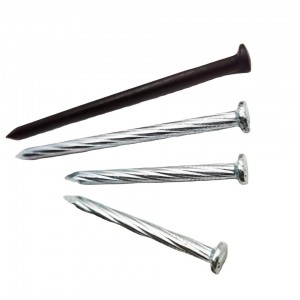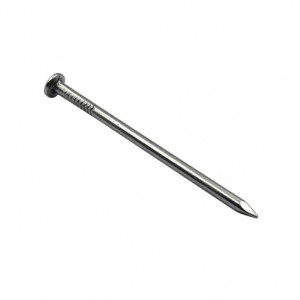When it comes to securing materials to concrete or masonry surfaces, concrete nails are the go-to solution. Designed specifically for this purpose, concrete nails offer a reliable and efficient fastening method. In this article, we will explore everything you need to know about concrete nails, including their types, characteristics, proper installation techniques, and the applications where they excel.
1.Types of Concrete Nails:
 1)Standard ConcreteNails:These are the most commonly used concrete nails, featuring a square or fluted shank with sharp edges. They are suitable for general-purpose applications and provide a strong grip due to the rough texture of theshank.
1)Standard ConcreteNails:These are the most commonly used concrete nails, featuring a square or fluted shank with sharp edges. They are suitable for general-purpose applications and provide a strong grip due to the rough texture of theshank.
2)Cut Masonry Nails:These nails have a chisel-like point, which helps to penetrate masonry surfaces easily. Cut masonry nails are primarily used for temporary installations or in situations where nails may need to be removed later.
3)ThreadedConcrete Nails:Threaded concrete nails have spiral threads along the shank, increasing their holding power and resistance to pull-out forces.
2.Characteristics of Concrete Nails:
1)Shank:Concrete nails have a unique shank design that provides excellent grip and resistance against withdrawal forces. The shank may be smooth, fluted, or threaded, depending on the nail type, with the aim of increasing stability and preventing nail movement.
2)Head Type:Concrete nails typically come with a wide range of head types, including flat heads, countersunk heads, or round heads. The choice of head type depends on the specific application and desired aesthetic finish.
3)Material:Concrete nails are typically made from hardened steel, making them strong and durable. Stainless steel or galvanized options are also available, providing increased resistance to corrosion, thereby ensuring long-term performance in outdoor or humid environments.
1)Construction and Framing: Concrete nailsare widely used in construction projects for attaching framing elements, such as wooden studs or metal plates, to concrete or masonry surfaces.
2)Carpentry and Woodworking:Concrete nails are also valuable in carpentry and woodworking projects where there is a need to fasten wood to concrete or masonry. They provide a reliable way to attach baseboards, molding, or shelving to these surfaces.
3)Outdoor Fixtures and Decorations: Concrete nails prove useful for anchoring outdoor fixtures like fences, trellises, or decorative elements into concrete or masonry, ensuring their stability and longevity.
Concrete nails are hot product,If you need any help,Pleasecontact us.
Our Website:/
Post time: Aug-28-2023

